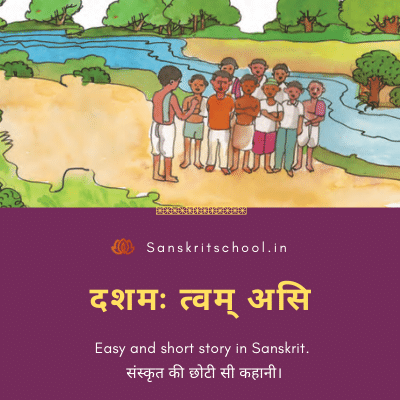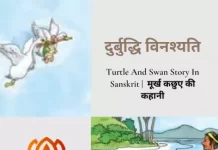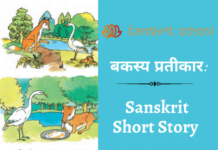विषयसूची / Table of Contents
संस्कृत में आसान और छोटी कहानी दशमः त्वम् असि
एकदा दश बालकाः स्नानाय नदीम् अगच्छन्। ते नदी जले चिरं स्नानम् अकुर्वन्।
ततः ते तीर्वा पारं गताः। तदा तेषां नायकः अपृच्छत् :-
अपि सर्वे बालका: नदीम् उत्तीर्णाः?
तदा कश्चित् बालकः अगणयत् :-
एकः, द्वौ , त्रयः, चत्वारः, पञ्च, षट्, सप्त, अष्टौ, नव इति।
सः स्वं न अगणयत्। अतः सः अवदत् :-
नव एव सन्ति। दशमः न अस्ति।
अपरः अपि बालकः पुनः अन्यान् बालकान् अगणयत्। तदा अपि नव एव आसन्। अतः ते निश्चयम् अकुर्वन् यत् दशमः नद्यां मग्नः।
ते दुःखिताः तूष्णीम् अतिष्ठन्। तदा कश्चित् पथिकः तत्र आगच्छत्। सः तान् बालकान् दुःखितान् दृष्ट्वा अपृच्छत् :-
बालकाः! युष्माकं दुःखस्य कारणं किम्?
बालकानां नायकः अकथयत् :-
‘वयं दश बालकाः स्नातुम् आगताः। इदानीं नव एव स्मः। एकः नद्यां मग्नः’ इति।
पथिकः तान् अगणयत्। तत्र दश बालकाः एव आसन्। सः नायकम् आदिशत् :-
त्वं बालकान् गणय।
सः तु नव बालकान् एव अगणयत्। तदा पथिकः अवदत् :-
“दशमः त्वम् असि इति।”
तत् श्रुत्वा प्रहृष्टाः भूत्वा सर्वे गृहम् अगच्छन्।
यह कहानी (दशमः त्वम् असि) संस्कृत की पुस्तक अमोदिनी से ली गई है।
This Story (Dasamah Tvam Asi) is taken from the Sanskrit book Amodini
दशमः त्वम् असि का हिंदी अनुवाद :-
दसवें तुम हो
एक बार दस बालक स्नान के लिए नदी पर गए। उन्होंने देर तक नदी के जल में स्नान किया।
फिर वे तैरकर नदी के पार गए। तब उनके नायक ने पूछा :-
क्या सभी बालक नदी पार कर गए हैं?’ अर्थात् क्या सभी नदी से बाहर आ गए हैं?
तब किसी बालक ने गणना की :-
“एक, दो, तीन, चार, पाँच, छः, सात, आठ, नौ इस तरह।”
उसने अपने आपको (स्वयं को) नहीं गिना। अतः वह बोला :-
“नौ ही हैं, दसवाँ नहीं है।”
दूसरे बालक ने भी अन्य बालकों को गिना। फिर भी नौ ही थे। अत: उन्होंने निश्चय किया कि दसवाँ नदी में डूब गया है। वे दुखी हो, चुपचाप बैठ गए।
तब कोई पथिक वहाँ आया। उसने उन बालकों को दुखी देखकर पूछा :-
“हे बच्चों! तुम लोगों के दुःख का कारण क्या है?”
बालकों के नायक ने कहा :-
“हम दस लड़के स्नान के लिए आए थे। अब हम नौ ही हैं। एक नदी में डूब गया है।”
पथिक ने उन्हें गिना। वहाँ दस बालक ही थे। उसने नायक को आदेश दिया :-
“तुम बालकों को गीनो।
उसने तो नौ बालक ही गिने।” तब पथिक बोला :-
“दसवें तुम हो।”
यह सुनकर सब खुश होकर घर चले गए।
इस कहानी के मध्यम से कवि बच्चों को संख्याओं से परिचित कराना या सिखाना चाहता है।
दशमः त्वम् असि का अंग्रेजी अनुवाद :-
“You are the tenth.”
Once ten boys went to the river for a bath. He took a bath in the water of the river for a long time.
Then they swam across the river. Then his head asked :-
Have all the boys crossed the river?’ That is, have all come out of the river?
Then a child calculated :-
“One, two, three, four, five, six, seven, eight, nine.”
He did not count himself. So he said :-
“There is only nine, not the tenth.”
The other boy also counted the other boys. Still there were only nine. So he decided that the tenth had drowned in the river. They were sad, they sat silently.
Then a wanderer came there. Seeing those children sad, he asked :-
“O children! What is the cause of your sorrow?”
The head of the children said:-
“We ten boys had come for a bath. Now we are only nine. One of us has drowned in the river.”
The wanderer counted them. There were only ten children there. He ordered the head:-
“Count you boys.
He only counted nine children.” Then the wanderer said :-
“You are the tenth.”
Hearing this, everyone went home happy.
Through this story, the poet wants to introduce or teach children about numbers.










Very Amazing article. Truly a great info.